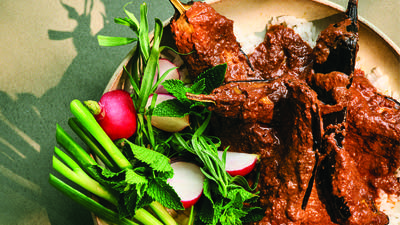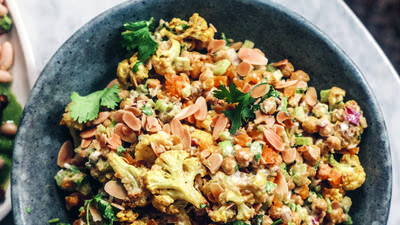
If you are chopping onions, you might want to wear your goggles, says Molly Birnbaum, executive editor of Cook's Science at America's Test Kitchen.
1. For a stronger taste, cut onions and garlic ahead of time
Sally Swift: If you talk to 10 different people about how to cut up an onion, everyone has a different opinion. Does the way you cut onion and garlic make a difference in the way they taste?
 Molly Birnbaum
Molly Birnbaum
Molly Birnbaum: It really does make a difference in the way they taste.
When you cut an onion or a clove of garlic, you're inciting an interaction within that clove or piece of onion. You're rupturing cells with your knife or with your teeth if you're chewing. When you break down those cells, you're releasing an enzyme. That enzyme interacts with an amino acid that's in a different cell in that garlic. When those two combine, they create a third component, one that has that super intense flavor or smell.
The flavor of garlic or onion then effectively does not occur until you start cutting it or chewing it. Even after you chop it, that flavor will continue to build for about 10 minutes or more. If you chop garlic ahead of time -- before you put it into a dish -- it'll get stronger, stronger and stronger.
2. Cut onions pole to pole; cut garlic into thin slices
 Photo: Chattrawutt / iStock / Thinkstock
Photo: Chattrawutt / iStock / Thinkstock
MB: When it comes to onions, what we recommend doing is cutting pole to pole with the grain of the onion so that you're rupturing fewer cells as you cut.
With garlic, you can cut it into thin slices rather than mincing it up or putting it through a garlic press. The garlic press is what really riles up all those cells, interactions and smell.
3. Mellow their flavor with a little bit of heat
SS: What happens when you heat them?
MB: That's the other way of controlling the flavor of alliums like onions and garlic. The enzyme that interacts with the amino acid in there gets denatured at a certain temperature. If you bring it up to about 140 degrees Fahrenheit, which is a light saute -- it's toasting a garlic clove with its skin still on in a dry pan for a while -- that enzyme is no longer working. It's no longer making these strong flavors. A little bit of heat will totally mellow out the flavor.
4. Or lemon juice
SS: What about acid? I know lots of people soak raw onion in vinegar or sometimes ice baths to try to cool it down, to tame it a little bit. Does that work?
MB: It does work. It helps a lot. We like soaking it in a little bit of lemon juice. Especially when you're making a Caesar salad, that really complements the flavor of the dressing. It also does calm down the flavor of the garlic.
5. Add salt to help onions cook down and brown
 Photo: VIPDesignUSA / iStock / Thinkstock
Photo: VIPDesignUSA / iStock / Thinkstock
SS: What about salting? How does salt react with the two of them?
MB: One of the things that we like to do when it comes to sauteing onions -- you've chopped up onions, you want to saute them for a dish -- we like to add salt immediately when we put it in. The salt helps bring the moisture out of the onions. It will help them cook down and brown up a little bit faster, so you get a nicer, deeper, browner flavor. They sweat a little bit with the salt.
6. Wear contacts to prevent tears while cutting onions
SS: You did a funny test on how to not tear up when you're cutting onions and garlic.
MB: We did a really fun and ridiculous test with two of our test cooks at America's Test Kitchen who were both very prone to crying. (Some people are more criers than others when it comes to the very specific enzyme that onions have that causes your eyes to tear up.)
What they did is they tried out every single test that they could think of -- all of the myths, all of the legends, everything that could possibly work. They put an unlit match in their teeth. They put a toothpick in their teeth. They put an onion on their head. They held a piece of bread in their mouth. They went full stop.
What they found worked best was wearing contact lenses, which of course, doesn't really work if you don't need contact lenses. Ski goggles, safety glasses, anything that blocks that chemical from entering your eyes will help.
7. You can eat sprouted garlic, but it tastes bitter
SS: What is the truth about using garlic that has a sprout coming out of it? Do you remove the sprout? Do you leave it?
MB: We did some tests in the kitchen. We've found that while there's nothing wrong with eating the sprout, it does have a little bit of a bitter flavor. We prefer to take it out before cooking with it.
Courtesy of America's Test Kitchen
Before you go...
Each week, The Splendid Table brings you stories that expand your world view, inspire you to try something new, and show how food connects us all. We rely on your generous support. For as little as $5 a month, you can have a lasting impact on The Splendid Table. And, when you donate, you’ll join a community of like-minded individuals who love good food, good conversation, and kitchen companionship. Show your love for The Splendid Table with a gift today.
Thank you for your support.
Donate today for as little as $5.00 a month. Your gift only takes a few minutes and has a lasting impact on The Splendid Table and you'll be welcomed into The Splendid Table Co-op.




